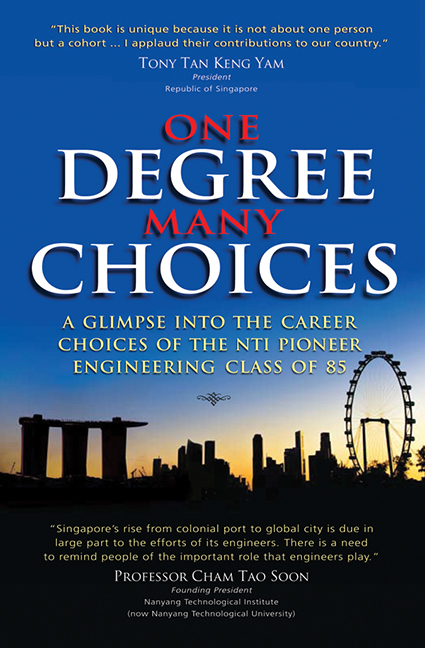 One Degree, Many Choices
One Degree, Many Choices from PART V - EPILOGUE
Published online by Cambridge University Press: 21 October 2015
“By way of preserving one's options for the future, few undergraduate courses can match engineering.”
— Koh Boon Hwee, Chairman of Board of Trustees, NTU (1993 – present)IN RECENT YEARS, LOCAL ENGINEERING courses have lost ground to courses such as business, law and medicine. Boon Hwee singled out two reasons for the decline. He pointed out that an engineering education is hard work. As society progresses, people can take softer choices. Three decades ago, engineering education was a pathway out of poverty for many. That is true of China and India today. They produce large numbers of engineers because it is the way to a better life. Engineers with an entrepreneurial bent tend to start their own companies. The shift from engineering and technology to the softer disciplines such as finance seems inevitable in all developed countries such as the United States and Europe.
Secondly, the structure of the world is such that the financial sector pays much better than engineering jobs. Boon Hwee said, “We may be sceptical of the value-add but young people are not stupid. For those who want to go where the money is, that is an easy and lucrative way.”
He is convinced that an engineering education holds great value for the future. “Engineering is the best undergraduate degree to pursue because the entire field is open to you at the graduate level,” said Boon Hwee. In the United States, people with an engineering degree go on to do medicine. They produce some of the most innovative medical devices that use a combination of engineering and medicine. It is also not surprising that some top bankers are engineers. Boon Hwee did his masters in business administration at Harvard Business School. He did a stint as the finance director in Hewlett-Packard Singapore prior to becoming managing director.
Boon Hwee added, “Engineers by definition have to understand mathematics. Finance is mostly mathematical models nowadays. By way of preserving one's options for the future, few undergraduate courses can match engineering.”
The declining interest in engineering, if left unchecked, does not augur well for Singapore's future. “Singapore is a major foreign exchange centre in the world,” he explained. “We trade financial services, financial products and commodities products. We do import and export.
To save this book to your Kindle, first ensure [email protected] is added to your Approved Personal Document E-mail List under your Personal Document Settings on the Manage Your Content and Devices page of your Amazon account. Then enter the ‘name’ part of your Kindle email address below. Find out more about saving to your Kindle.
Note you can select to save to either the @free.kindle.com or @kindle.com variations. ‘@free.kindle.com’ emails are free but can only be saved to your device when it is connected to wi-fi. ‘@kindle.com’ emails can be delivered even when you are not connected to wi-fi, but note that service fees apply.
Find out more about the Kindle Personal Document Service.
To save content items to your account, please confirm that you agree to abide by our usage policies. If this is the first time you use this feature, you will be asked to authorise Cambridge Core to connect with your account. Find out more about saving content to Dropbox.
To save content items to your account, please confirm that you agree to abide by our usage policies. If this is the first time you use this feature, you will be asked to authorise Cambridge Core to connect with your account. Find out more about saving content to Google Drive.